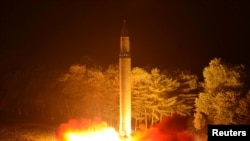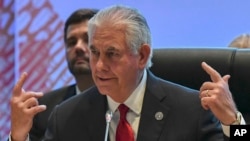North Korea vowed Monday to persist in its nuclear weapons development program, rejecting calls from the international community to rein in its aggressive military actions.
Pyongyang's United Nations mission contended that new U.N. sanctions against it for its missile tests were a "flagrant infringement upon its sovereignty," with state media claiming they were the result of a "heinous U.S. plot to isolate and stifle" the communist country.
North Korea told a security conference of key regional leaders in Manila that it would never bargain away its development of nuclear weapons or ballistic missiles, and said that it would teach the United States a "severe lesson" with nuclear strategic force if Washington takes military against it.
Pyongyang said it is a responsible nation state with no intent to threaten any country other than the United States unless they join Washington in military action. But North Korea boasted that its latest missile test in late July showed the world that the "entire U.S. mainland is in our firing range."
Tillerson: Stop testing
North Korea's response to the U.N. sanctions came as U.S. Secretary of State Rex Tillerson said the best step Pyongyang could take to signal it is ready for dialogue would be to halt its missile tests.
"We’ve not had an extended period of time where they have not taken some type of provocative action by launching ballistic missiles. So I think that would be the first and strongest signal they could send to us is just stop these missile launches," Tillerson said. He also spoke in Manila, where he is taking part in the regional forum of the Association of Southeast Asian Nations.
China, North Korea's economic lifeline, said it is fully committed to enforcing the U.N. sanctions intended to deprive North Korea of $1 billion in annual export money Pyongyang is using to fuel its illicit nuclear and ballistic missile program.
"China will for sure implement that new resolution 100 percent, fully and strictly," Foreign Minister Wang Yi told reporters on the sidelines of the Manila meeting.
In the U.S., the White House said that President Donald Trump talked with Tillerson and chief of staff John Kelly about North Korea for an hour. Trump has demanded quick implementation of the new sanctions aimed at curbing North Korea's exports of coal, iron and iron ore, lead and lead ore, and seafood.
Tillerson said Saturday's U.N. Security Council vote unanimously adopting new sanctions against North Korea for its ballistic missile tests sends a message that the entire international community finds the country's actions unacceptable, and that the clear expectation is a denuclearized Korean peninsula.
"We hope again that this ultimately will result in North Korea coming to the conclusion to choose a different pathway, and when the conditions are right then we can sit and have a dialogue around the future of North Korea so that they feel secure and prosper economically," he said.
Revenge threat
North Korea, in the statement carried by state media, pledged to launch a "thousands-fold" revenge on the U.S. and reiterated its stance that sanctions will not force it to negotiate over its nuclear program.North Korea said it will take "action of justice," without elaborating, and said the U.S. would be making a mistake if it believed its mainland is safe because an ocean separates the two countries.
The White House said Trump and South Korean President Moon Jae-in committed in a phone call to fully implement all relevant U.N. resolutions related to North Korea and to "urge the international community to do so as well."
The statement late Sunday said Trump and Moon also welcomed the new Security Council resolution and reiterated their belief that North Korea "poses a grave threat" to their countries and Japan.
China urges end to provocation
Earlier Sunday, China pressed North Korea to halt its missile and nuclear tests, saying Pyongyang should not "provoke international society's goodwill."
Chinese Foreign Minister Wang delivered Beijing's warning to his North Korean counterpart Ri Yong Ho on the sidelines of the ASEAN ministerial meetings.
The United States cautiously welcomed China's newfound support of sanctions against North Korea, but said that it would closely monitor China's compliance with the penalties.
Susan Thornton, the top U.S. diplomat for Asia, told reporters that in the past China has supported efforts to curb Pyongyang's weapons development, but then slacked off.
"We want to make sure China is continuing to implement fully the sanctions regime," Thornton said,"not this kind of episodic back and forth that we've seen."






